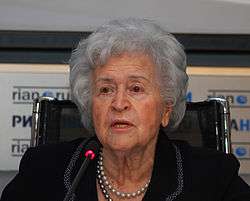Irina Antonova

Irina Aleksandrovna Antonova (Russian: Ирина Александровна Антонова) (born 20 March 1922, Moscow) was the Director of the Pushkin Museum of Fine Arts in Moscow for 52 years, from 1961 to 2013, making her the oldest and the longest serving director of a major art museum in the world. Among her many awards and decorations are the State Prize of the Russian Federation and the Ordre des Arts et des Lettres. She is now the President of the Pushkin, a ceremonial post.[1]
Career
Antonova studied under Boris Vipper at the Moscow University, graduating in 1945. Later that year she joined the staff of the Pushkin Museum, where she has worked ever since. In February 1961 Nikita Khrushchev put her in charge of the museum.
Antonova witnessed as the entire collection of the Dresden Gallery arrived to the museum from Germany in 1945 and was removed from it ten years later. She opposed the return of the collection to Germany, claiming it was a just compensation for the damage inflicted on Russia's cultural heritage by the German invaders. The museum still holds Priam's Treasure, looted by the Red Army after the Battle of Berlin.
Antonova's interests revolve around Impressionist and Modern art. In 1948, the Pushkin Museum acquired considerable holdings of these works from the nationalized collections of Sergei Shchukin and Ivan Morozov. Antonova was also instrumental in establishing Svyatoslav Richter's December nights, an international music festival that has been held in the museum since 1981.
Antonova had long supported the recreation of the State Museum of New Western Art, a museum created from the collections of Sergei Shchukin and Ivan Morozov, destroyed by Stalin in 1948.[1] The collections of the museum were dispersed to the Pushkin and the Hermitage Museum. The Hermitage has been reluctant to let its collection go to the proposed museum and Antonova and the Hermitage director, Mikhail Piotrovsky publicly disagreed over the issue.[1]
The Russian Government proposed an online "virtual museum", which Antonova rejected.[1] A spokesperson for Russian President Vladimir Putin said that "the chances of creating such a museum fall significantly" after Piotrovsky's disapproval. Antonova later said people who were against the recreation of the museum were "adhering to a decree of Stalin."[1] Shortly after the controversy, Antonova was fired and replaced by Marina Loshak.[2]
Antonova oversaw art collections which were taken by Soviet Union from Germany after World War II. She first denied that such collections exist, and when it was apparent that they exist started publicly stating that the collections were taken to the Soviet Union legally and should be exempt from the restitution.[3]
Honours and awards
- Order of Merit for the Fatherland:
- 1st class (December 6, 2007) - for outstanding contribution to the development of museums, preservation and promotion of national and world heritage
- 2nd class (20 March 2002) - for outstanding contribution to the development of national culture
- 3rd class (17 March 1997) - for services to the state and the great personal contribution to the preservation of national cultural heritage of Russia
- Order of the October Revolution
- Order of the Red Banner of Labour
- Honored Artist of Russian Federation
- State Prize of the Russian Federation (1995)
- Commander of the Order of Arts and Letters (France)
- Commander of the Order of Merit of the Italian Republic (7 December 2000)
- Public Prize "Treasury of the Motherland"
References
- 1 2 3 4 5 Miriam Elder (2 July 2013). "Doyenne of Russia's art world ousted from Pushkin Museum at 91". The Guardian. London.
- ↑ Elder, Miriam (1 July 2013). "Doyenne of Russia's art world ousted from Pushkin Museum at 91". The Guardian. Retrieved 9 July 2013.
- ↑ "Директор ГМИИ им. Пушкина Ирина Антонова: "Реституция невозможна, и я объясню вам почему"". news.ru. 15 November 2005. Retrieved 19 March 2016.
| Wikimedia Commons has media related to Irina Antonova. |
- (Russian) "Irina Antonova Celebrates Her 85th Birthday"
- (Russian) Interview in the Rossiyskaya Gazeta